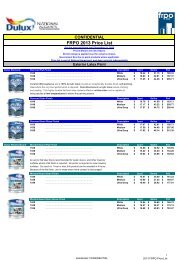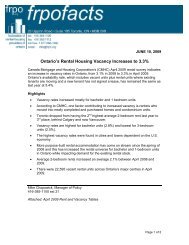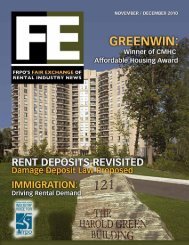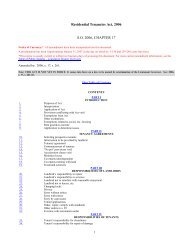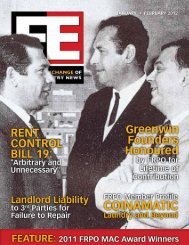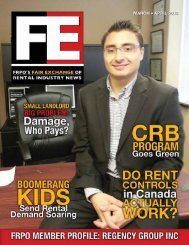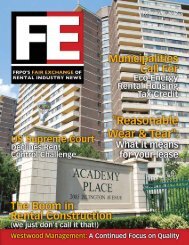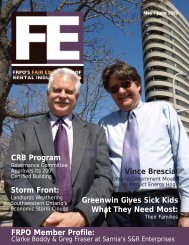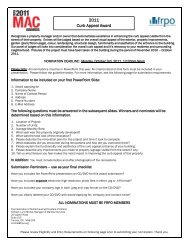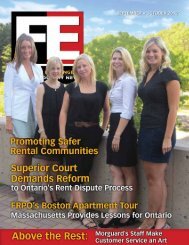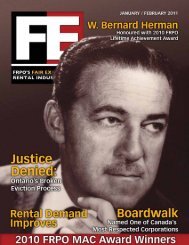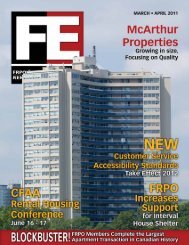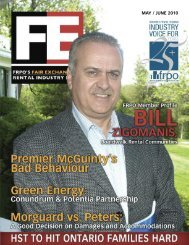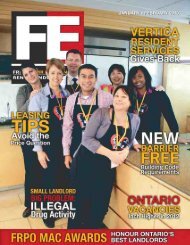Create successful ePaper yourself
Turn your PDF publications into a flip-book with our unique Google optimized e-Paper software.
Fair Exchange • <strong>Sep</strong>tember / <strong>Oct</strong>ober <strong>2009</strong><br />
• Whether an N4 or other notice is<br />
fatally defective just because dates<br />
are reversed or a month is shown<br />
with the wrong number of days<br />
(<strong>No</strong>vember 31 st for instance).<br />
• What factors a landlord should consider<br />
after a tenant has moved out<br />
leaving some items behind before<br />
re-renting the unit, or filing an<br />
application to have the Board find<br />
that the unit has been abandoned<br />
• Whether a tenant who gives notice<br />
to terminate the tenancy orally has<br />
given proper notice, and whether<br />
the landlord should then be obliged<br />
to mitigate by attempting to rerent,<br />
despite the risks involved of<br />
having no written notice.<br />
• Whether a tenant is entitled to an<br />
opportunity to fix something<br />
they have damaged before being<br />
served with an N5 notice rather<br />
than have the landlord fix it to its<br />
standards and with its expertise.<br />
• Whether a single-shareholder<br />
corporate landlord with the<br />
human shareholder acting as the<br />
landlord can obtain his or her<br />
house back with a landlord’s own<br />
use application.<br />
• Whether a tenant who by way of<br />
a motion asks the Board to void<br />
an arrears order after a Sheriff<br />
filing, has to also have paid the<br />
new rent for the month in which<br />
the motion hearing takes place.<br />
• Whether supportive housing<br />
landlords funded through the<br />
Ministry of Health and Long-<br />
Term Care and not governed by<br />
the Social Housing Reform Act<br />
may evict a tenant who can no<br />
longer live independently and is<br />
at risk to themselves and others.<br />
• How should the Board handle<br />
utilities when the tenant is obligated<br />
under a tenancy agreement<br />
to pay them but doesn’t<br />
• How to avoid lease-breaking<br />
parties when the legislation<br />
allows a tenant with “remaining<br />
lease term” to simply act badly so<br />
that they are served with a termination<br />
notice, thereby ending<br />
their obligation to pay rent for<br />
the duration of the lease term<br />
• Whether on a no-fault application<br />
for demolition or landlord’s<br />
own use, the Board should consider<br />
the tenant’s circumstances<br />
prior to eviction, and if so, how<br />
to apply the findings.<br />
• How does one count the number<br />
of voiding days on an N5 notice,<br />
the most common of the conduct<br />
notices, and furthermore, how<br />
does one figure out what constitutes<br />
a breach during the voiding<br />
period, and finally why can’t a<br />
landlord serve a second N5 notice<br />
unless the first has been voided<br />
• Whether the tenant’s willful<br />
blindness should have a bearing<br />
on eviction resulting from<br />
serious illegal acts that were<br />
committed by others in the<br />
rental unit.<br />
• What constitutes persistent late<br />
payment of rent<br />
• What is the standard of proof<br />
required when the landlord’s allegations<br />
about a tenant relate to<br />
criminal activity or conduct that<br />
is morally blameworthy (F.H. v.<br />
McDougall, [2008] S.C.C.)<br />
• How do rentals in condominiums<br />
fit into the statutory regime when<br />
a dispute occurs Who is the landlord<br />
What if there is a conflict of<br />
laws How can the landlord be<br />
held responsible for the common<br />
areas and common elements over<br />
which it has no control<br />
• How does the Board handle rent<br />
increases when the parties agree<br />
to add a prescribed additional<br />
service or facility such as window<br />
air-conditioning, and what<br />
happens if the tenant adds them<br />
unilaterally without an agreement,<br />
and then refuses to pay<br />
• Electrical sub-metering and<br />
smart metering, need I say more.<br />
• How far back can a tenant go<br />
with claims about maintenance,<br />
harassment or illegal rent, and<br />
how far back can the Board order<br />
compensation for same<br />
• How should the Board deal with<br />
unpaid rent, or prospective rent,<br />
when ordering a rent application<br />
adjourned as a result of the<br />
tenant’s request or an action by<br />
the tenant, particularly now that<br />
return dates after an adjournment<br />
are becoming distant events<br />
• How should the Board deal<br />
with Board mediated agreements<br />
or consent orders when<br />
the tenant doesn’t fulfill its part<br />
of the agreement<br />
continued...<br />
24



